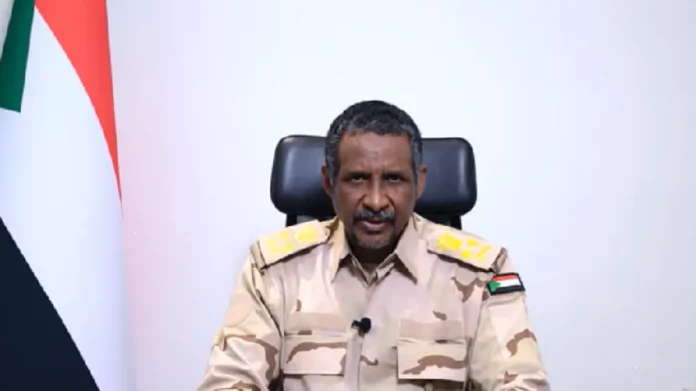The RSF chief’s warning to hit airports “inside or beyond Sudan” reflects both escalating desperation and growing regional risk, analysts say
The RSF leader’s vow to strike neighboring states highlights the war’s widening danger and his struggle to remain relevant
In the dim glow of a late‑night video address, Sudan’s most notorious warlord delivered a message that sent shockwaves far beyond his country’s borders. Mohamed Hamdan Dagalo known to the world as Hemedti stared into the camera, his tone cold and deliberate. Any aircraft or drone launched “from inside Sudan or from a neighboring state,” he warned, would now be “a legitimate target.”
The words marked a new level of threat from the Rapid Support Forces (RSF) commander, signaling that Sudan’s grinding civil war—already the world’s largest humanitarian catastrophe—could soon spill into regional airspace.
Threats Beyond the Border
Hemedti claimed that drones striking RSF positions were being operated from “a neighboring airport,” without naming the country. “They will be dealt with accordingly,” he said, in a statement both defiant and menacing. His declaration, analysts note, risks opening an entirely new front in the two‑year‑old war, one that could drag Sudan’s fragile neighbors into the fight.
The commander’s remarks followed days of angry exchanges with Sudan’s army after a deadly drone strike in the town of Al‑Mazroub, North Kordofan, killed several tribal leaders, including a prominent clan chief, Suliman Jaber Jumaa Sahl. While Hemedti blamed the army and accused it of waging “ethnic cleansing,” military officials dismissed the charges, calling the incident “an RSF provocation.”
“We Will Eradicate the Cancer”
The address, released on October 22, blended justification with rhetoric of vengeance. Hemedti lauded his fighters and called on Sudan’s youth to continue the battle against what he described as “the cancer of the Islamic movement.” He urged international investigators to probe alleged war crimes “since the April coup,” portraying himself as both a victim and avenger in a war that has claimed tens of thousands of lives and displaced more than 12 million people.
Hours after his speech, Khartoum’s skies lit up again. Explosive drones struck the capital’s international airport for the second time in two days, delaying its planned reopening. The army blamed the RSF, calling the attacks “proof that terrorism, not liberation, motivates the militia.”
A Struggle for Relevance
For Hemedti, whose forces have suffered serious battlefield losses since being expelled from the capital, the threats are as political as they are military. Analysts believe his new rhetoric is designed to project strength amid declining influence—and to remind both regional powers and international mediators that he remains a force to be reckoned with.
Yet his latest threats may backfire. “By vowing to attack airports in neighboring countries, Hemedti risks uniting the region against him,” said one regional observer. “It’s a gamble born out of desperation.”
As Sudan’s cities lie in ruins and famine looms across the country, Hemedti’s dramatic warning adds yet another layer of peril to a conflict already defined by chaos. The war that began over control of the capital now threatens to redraw the map of the entire region.


